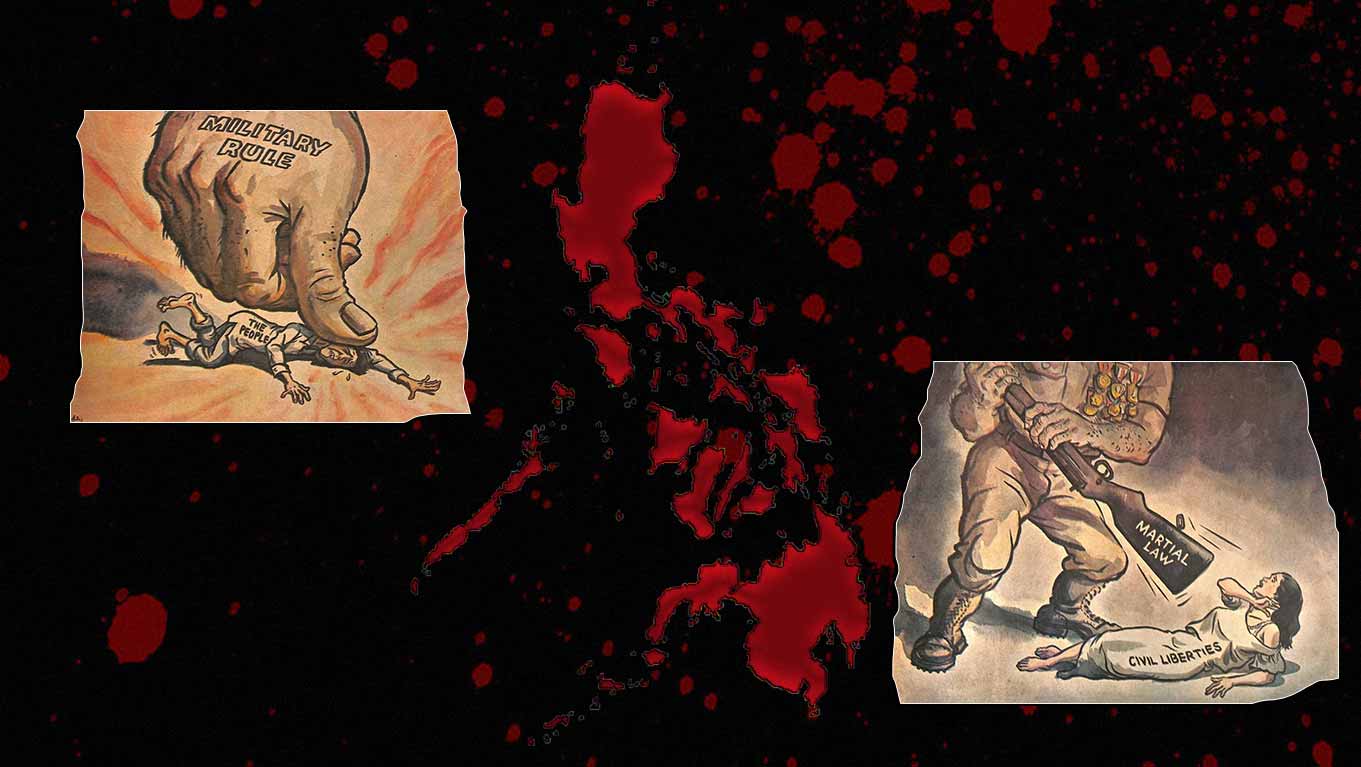On social media, the chokehold of historical revisionism on Martial Law has only grown in confidence. To counter these self-proclamations, we pore through artistic sources that seek to educate and rightfully reclaim history from the oppressors.
There is a lot more to history than most people care to acknowledge. Beyond just the cracking of spines to reveal dusty and yellowed pages in books, remembering names and dates, and writing them down only when necessary, the function of history is to instruct us on how we approach the future. It requires an exacting comprehension that relates to particular contexts. To say, therefore, that one is familiar with this subject of history is no more than just an empty acknowledgement of the past, because it isn’t just an exercise of memory, but rather of thought. Ignoring this is not only an obscene oversimplification, but a step into the doorframe of historical revisionism.
Over the course of history, revisionism was always well in place, especially by oppressors and opportunists who seek to exploit the narrative for their selfish gains. While it certainly is no new thing, the conversation has resurfaced in the past few days leading up to the anniversary of the declaration of Martial Law in the Philippines during the regime of the late dictator, Ferdinand Marcos. From decidedly sanitized and one-sided fluff interviews masquerading as neutral ground to deliberate erasures of the injustices and atrocities of human rights, historical revisionism threatens the threshold of a most critical election in the coming year.
This is only made more concerning because of the many access points where self-proclaimed historians and content creators have infiltrated, peddling misinformation with their take on “research.”
Do You Remember?
It is curious to fend off aggressive efforts of historical revisionism pertaining Martial Law, all of which are broadcasted on YouTube, TikTok, and the cesspool of fake news, Facebook, because can will argue that all these are already being taught in school with dedicated chapters in classes and courses. But with the rampant romancing of the Marcos regime, it seems that the lessons didn’t quite stick with the Filipinos, especially to a generation that has been handed a diluted version of the recorded brutalities that actually happened.
“‘Yung pag alam sa kasaysayan ay hindi lang ‘yung pag memorya ng mga petsa at pangalan, kundi ang mga aral na makukuha na mula satrahedya na nangyari noon. Pag sinabi natin na dapat mag move on na, parang sinabi natin dapat kalimutan na ‘yung nakaraan. Kumbaga sa wikang Ingles, let bygones be bygones,” details journalist and educator, Danilo Arao, in an interview for On The Spot TeleRadyo. “Hindi uubra yun sa sitwasyon na maraming pinatay at tinorture nung panahon ng martial law, ‘yung media pinasara…no amount of fake news would dispel the fact na merong mga kinulong at may napatay na peryodista at aktibista nung panahong ‘yun. So, hindi pwedeng excuse ‘yung, halimbawa, ‘yung kabataan hindi naman nabuhay ng martial law, so wala silang karapatang magbigay ng opinyon tungkol dito. Mali po ‘yun kasi malinaw naman ang dokumentasyon sa kasaysayan mismo.”
To even consider reprieve for the inhumanity under the rule of the Marcos dictatorship at a supposed age of enlightenment and liberty is baffling. That is precisely historical revisionism at work, one that is being used to deny justice to everyone who suffered under the iron fist rule of Martial Law.
Challenging Historical Revisionism
“There was and is a concerted effort to rehabilitate the Marcos name and to portray the Martial Law days as a kind of golden age in our history even though the facts as well as the actual experiences of our countrymen attest to that regime as being anything but a golden age,” film writer Noel Pascual explains in the Philippine Star. So, how does one counter the implications of historical revisionism, especially amid the apparent decay of democracy?
Of course, there are many ways to approach this challenge, but one way to address it is through the arts, another major point of contention during Martial Law, which saw a swell of subversive works of dissent and outcry despite censorship. Laced in prose and poetry, film and television, and song and imagery, the gutting realities and harrowing truths were not only a reflection of the times, but were dutifully created to expose the wrongs of the tyranny, as well as to awaken the nation to action. (You can leaf through necessary literature such as Prometheus Unbound by Pete Lacaba (under the pseudonym Ruben Cuevas) and Conjugal Dictatorship by Primitivo Mijares.) Even to this day, these vivid sources compel the senses of an audience oblivious to the tragedies of Martial Law. In this imagined memory, facts are charged to fiction in an expansive effort to reclaim history from the apologists and rabid revisionists.
In the form of pursuits of passion, great purpose is charged within to not only entertain, but most importantly, educate. Challenging historical revisionism of Martial Law, audiences old and new are able to “experience the drama and the brutality of the era by making them identify with those who experience the horrors of the dictatorship onscreen, arousing the individual or collective sense of horror, pity, disgust and rage,” says Concerned Artists of the Philippines spokesperson, Lisa Ito. “Art can distill memories, lived experiences, and narratives of hardship and struggle into compelling stories and powerful images that stand the test of time. No amount of whitewashing and lies can erase that.”
Never Again, Never Forget
History is not only there to remember on red-letter days. With it comes a responsibility to not only endure, but to effectively educate generations to come. In a rush to escape the clutches of the past, one should not abandon it and leave it to the grubby hands of ignorant fools, because if left alone, the truth of Martial Law will continue to be at the mercy of historical revisionism, impaled by distractions and lies further eluding justice.
As we reap the right and privilege to life and freedom, it is high time we assume the duty of guarding history, in whatever capacity one sees fit. From the arts to social media, the commitment to remembering the truth is loud and clear today and always: Never Again and Never Forget. There’s no room for amnesia, girl.
Challenging historical revisionism, from these documentaries shown in schools to critically acclaimed films, as well as of online through podcasts and virtual museums, there are different paths you can take to fight back misinformation.
FILMS
In the wealth that matters in this conversation, there are a lot of films that tackle martial law. From the seminal classics such as Maynila Sa Kuko Ng Liwanag, Ganito Kami Noon, Paano Kayo Ngayon, Batch ’81, Sister Stella L., and Orapronobis, among many others, to more contemporary movies like Dekada ’70, Barber’s Tales, Respeto, Citizen Jake, Liway, and ML, these stories not only hold up, but are painful reminders of the abuses and atrocities during martial law now falling prey to historical revisionism.
DOCUMENTARIES
Whether it be in a school setting or as a focused point of interest growing up, documentaries are a powerful way to inform. There have been many narratives on historical revisionism that have made their way to the mainstream from the international film festival circuits, the most recent being Aswang and A Thousand Cuts. More specific to Martial Law, you can turn to the standard Batas Militar by Jeannette Ifurung and Jon Red, Forbidden Memory by Teng Mangansakan, and The Kingmaker by Lauren Greenfield as excellent resources.
PODCASTS
With nothing but the words and facts, podcasts are the more streamlined and straightforward way to comprehend Martial Law and the threat of historical revisionism. While going about your day-to-day, you can press play on the Tula Somebody (Pete Lacaba/BLKD, Lualhati Bautista/Etta Rosales) by The Linya Linya Show and the kid-friendly, Habilin by Give A Hoot.
MUSEUMS
Since flocking in enclosed spaces seesaw from limited to non-existent in the pandemic, digital spaces have been available to the public, tackling every exhibition in the realm of arts and design. But did you know that there are virtual museums dedicated to Martial Law? Serving as a memorial to the pivotal period in Philippine history, martiallaw.ph and martiallawmuseum.ph offer learning and teaching resources, insight and information, as well as critical reflections in the face of historical revisionism. Here, making a stand and vigilance are the cornerstone of artistic expression for everyone to see learn and hopefully, never forget.
MUSICAL
While entertainment is meant as a form of escape from life’s realities, there are those that their creative pursuits to confront historical truths. Proving that the topic of Martial Law will always be necessary, a musical adaptation was brought to life in the Black Box Production of Lualhati Bautista’s Dekada ’70 (the same source the earlier mentioned film took inspiration from). You can listen to some of the songs here.
CHILDREN’S BOOKS
Deceptively simple with its storytelling and imagery, there is whole lot more to children’s literature as something juvenile. Cultural touchstones in itself, these books that are written and illustrated for kids is a seedbed of knowledge and moral compass with its treasure trove of subversive truths. While subjects such as Martial Law is a complex one to grasp, especially for stubborn grown-ups, one will be surprised to see how much more receptive and cognizant children are of things beyond their perceived scope. Compelling and charming, get a head start on the educational system with a selection of children’s book bravely telling the story of Martial Law such as Si Jhun-Jhun, Noong Bago Ideklara Ang Batas Militar (by Augie Rivera, illustrated by Brian Vallesteros), EDSA (by Russell Molina, illustrated by Sergio Bumatay III), Isang Harding Papel (by Augie Rivera, illustrated by Rommel Joson), and At The School Gate (by Sandra Nicole Roldan, illustrated by Nina Martinez). Not only limited to the young’uns, these pieces of literature are a written reminder for older generations to never forget the atrocities and inhumanity of the Marcos regime under the rule of Martial Law. And just like the words of Emma’s father in At The School Gates, we remember that “As long as there’s something wrong, you don’t stop fighting. You just learn to fight in a different way.”
CONTINUE READING: WHY VOTE IN THE 2022 ELECTIONS? BECAUSE YOU ARE MORE POWERFUL THAN THE ELECTED





